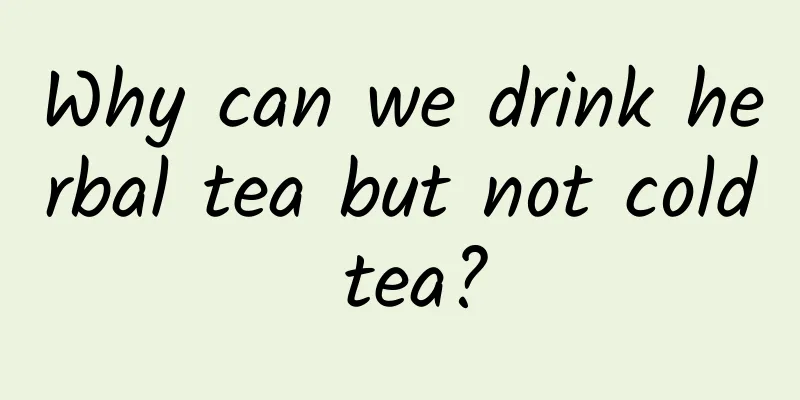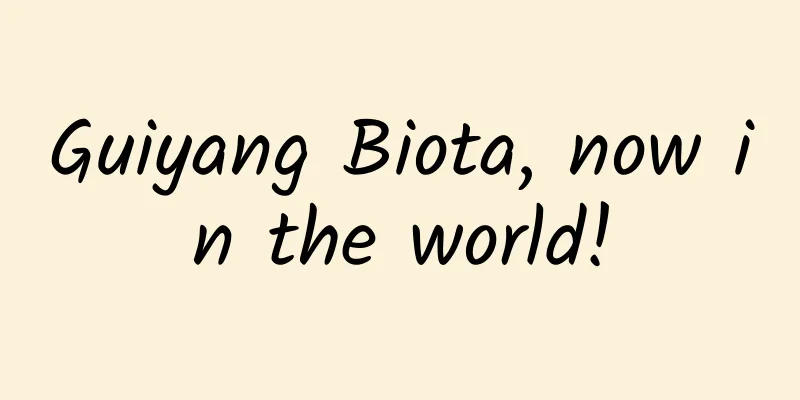Why can we drink herbal tea but not cold tea?

|
Audit expert: Wang Guoyi Postdoctoral fellow in Nutrition and Food Safety, China Agricultural University In the hot summer, after a busy day at work, there is nothing more enjoyable than rewarding yourself with a cup of sweet and delicious herbal tea that can dispel heat and refresh you. Speaking of herbal tea, you may have such doubts: herbal tea can be drunk cold, but can cold tea be drunk? In fact, herbal tea is not cold, nor is it tea. It originated in Guangdong, Hong Kong and Macao. It is a kind of daily beverage prepared by local people under the guidance of the health theory of traditional Chinese medicine and using Chinese herbal medicine as raw materials. It has the effects of clearing heat and detoxifying, promoting body fluid and quenching thirst, dispelling heat and removing dampness. So herbal tea is not cold tea. You can drink herbal tea with confidence, but don't drink cold tea anymore. Source of herbal tea|See watermark Why can’t we drink cold tea? As early as the time, the tea saint Lu Yu mentioned in “The Classic of Tea, Part Five: Boiling” that tea should be “drunk while hot”, at which time “the heavy and turbid elements condense at the bottom, and the essence floats on the top”. Otherwise, the “essence will be exhausted with the breath, and it will not be digested by sipping”. To put it simply, when the tea is hot, the tea leaves sink to the bottom, and its essence floats on the surface of the tea soup, which is fragrant, less bitter, and has a rich taste. If the tea soup is cold, the essence of the tea will dissipate with the gas, and the tea soup will taste bland and have a poor taste, making it unsuitable for drinking, especially for the elderly and those with weak qi. In addition, if the tea soup is left for too long, the nutrients in the tea, such as tea polyphenols, are easily affected by external factors and promote the growth of bacteria and mold, posing a threat to our health. Therefore, brewed tea should be drunk while it is hot, and cold tea and overnight tea should be avoided as much as possible. However, you can't drink cold tea, nor hot tea. Our esophageal mucosa is relatively fragile, and the optimal temperature is 50-60 degrees. After being stimulated by hot tea, it will cause damage to the esophageal mucosa, thus causing lesions and increasing the risk of cancer. If you accidentally drink hot tea, don't force it to swallow, spit it out immediately to avoid oral diseases. Warm tea is the best, not hot or cold, neutral in nature, most suitable for drinking, and most suitable for nourishing people. In this way, tea should be drunk while it is hot, unless you are drinking cold brewed tea. Source: Baidu Encyclopedia What is cold brew tea? Cold brew tea originated in Taiwan. As the name suggests, it is brewed with cold or ice water to extract the flavor of the tea leaves. Brewing tea in this way can first dissolve the sweet amino acids in the tea leaves and reduce the release of caffeine and tea tannins. Therefore, cold brew tea is not bitter or astringent and is loved by the public. Compared with the traditional way of brewing tea, cold brewing takes longer, and you may even have to wait for several hours before drinking it. However, not all teas are suitable for cold brewing. Generally, green tea, white tea, and lightly fermented oolong tea are more suitable, while fermented teas such as black tea and Pu'er tea may taste worse if cold brewed. It should be reminded that when cold brewing tea at home, it should not be left at room temperature for more than 4 hours, otherwise it may cause the growth and reproduction of microorganisms and cause gastrointestinal discomfort. Cold brew tea source | Baidu Encyclopedia So what are the advantages and disadvantages of drinking cold brew tea? Benefits: Cold brewed tea tastes sweet, and drinking it in moderation can clear away heat and cool blood, detoxify and relieve summer heat, and can also prevent wind-heat colds. In addition, the content of tea polyphenols in cold brewed tea is also relatively high, which has the effects of lowering blood pressure, blood sugar, and blood lipids. It is also rich in B vitamins, which can play a role in refreshing the mind. Disadvantages: As a cold drink, drinking cold brewed tea may reduce appetite, and for people with weak stomachs, it may irritate and damage the stomach, causing diarrhea, abdominal pain, etc. Source|See watermark How to make a good cup of tea? To make a good cup of tea, the quality of the tea itself is important, but the influence of water temperature, teaware, method, time and other factors on the tea quality cannot be underestimated. Among them, the control of water temperature is very important for the presentation of tea properties. High temperature helps the rapid infiltration of tea flavor, but it should be noted that high temperature may burn the tea leaves and easily make the tea bitter. Therefore, the water temperature for brewing tea must be determined according to the tea. Source: pixabay For example, tea cakes with relatively high raw material grade and tea with a certain age are suitable for brewing with boiling water; tea with relatively tender raw materials or relatively new tea is suitable for brewing with water with slightly lower water temperature. The length of time that tea is soaked in water is also very important for the aroma and taste of tea. Generally speaking: the soaking time of old tea and rough tea is long, and the tea soup is slow to come out, while the soaking time of new tea and tender tea is short, and the tea soup is fast; the soaking time of handmade Pu'er tea is long, and the soaking time of machine-made Pu'er tea is short; the soaking time of compressed tea is long, and the soaking time of loose Pu'er tea is short. When brewing, it still depends on the nature of the tea. But the length of the soaking time is also part of the water temperature control for brewing tea. As early as in ancient tea books, there were studies on the effects of water of different temperatures on tea. For example, Cai Xiang's "Cha Lu" in the Song Dynasty mentioned "unripe tea", "overripe tea" and "waiting tea", and Xu Cishu in the Ming Dynasty mentioned "tender water", "old water" and "water at the right time" in "Cha Shu". Although the two are called differently, they have the same goal. Source: pixabay The so-called "unripe soup" or "tender" refers to the water temperature before it boils, which is about 60℃--65℃. At this time, because the water temperature is too low, even the fresh green tea is not easy to brew, the tea leaves do not absorb enough water, the aroma and taste are weak, and they are easy to float on the water surface, which is neither convenient nor delicious to drink. "Old water" or "overcooked soup" refers to water that has been completely boiled or has been boiling for a period of time. At this time, the water temperature is roughly around 100°C, and brewing green tea will "cook" relatively young green tea leaves. High temperature helps the tea leaves dissolve. The higher the temperature, the thicker the tea soup, and the color of the tea soup is more likely to change. In addition, a large amount of tea tannins and caffeine are released, which will make the tea taste bitter. "Hou Tang" means "the water is at that time", which refers to the state when hot water has just started to boil slightly after bubbling. The water temperature is roughly between 80℃ and 95℃. At this time, if you brew a cup of relatively tender green tea, the theanine in the tea leaves will be completely released, vitamin C will be relatively intact, less tea tannin and caffeine will be released, the aroma will be fresh and far-reaching, and the tea taste will be fresh, sweet and refreshing, which is really beautiful. Chinese tea culture is extensive and profound. If you have time, you might as well make a cup of tea to taste carefully. Of course, you can also have a cup of cold brew tea when the weather is hot~ |
<<: How healthy is quinoa that something so unpalatable can become so popular?
>>: It can make a living by its appearance, but it still relies on its "real ability"
Recommend
The key to optimizing Bitmap memory usage: image resolution, folder storage and loading strategy
Memory usage calculation formula for images Image...
Tesla and other automakers are expected to produce electric vehicles in China as policies are relaxed
Recently, according to foreign media, some of Chi...
Toyota provides Tokyo with hydrogen fuel cell buses that can be used as generators in emergencies
Foreign media reports Toyota recently said it wou...
Gaia-0 Basic Beginner Short Video Monetization Training Camp
Gaia-0 Basics Novice Short Video Monetization Tra...
If 40 varieties of fruit grow on one tree, can they be delicious?
It is not surprising that ancient paintings and t...
The State Administration of Radio, Film and Television shot a blockbuster advertisement! ! !
Legend has it that there is such a mysterious org...
Weibo KOL placement guide (Part 1)
I know that 50% of my advertising dollars are was...
Sharing of case studies on SEO operation ideas for Yizhu Decoration website!
I have just taken over the SEO of Yizhu Decoratio...
There are so many promotion channels, how can we combine them to maximize traffic!
Currently, the total number of mobile app users h...
You don’t use the ready-made teachers, and you still have the nerve to say that you “can’t find the door to product operation”?
Among the BAT Big Three, Tencent has been critici...
Traditional cultural knowledge supporting Qingming Festival: the structure of the underworld!
Mixed Knowledge Specially designed to cure confus...
The new version of the APP is launched. Have you done these operations?
The APP has just been launched, so naturally ther...
How much does it cost to develop a WeChat applet ordering system?
How much does it cost to develop a WeChat mini pr...
70 years ago, two young men made a groundbreaking discovery that led to global life sciences
Introduction This year marks the 70th anniversary...







![[Moving bricks for profit] Mengtu earns 100,000 yuan a year in the first phase of the basic course + advanced course of the brick-moving team](/upload/images/67cc033f25556.webp)

![[Live] Sunflower Technical Director Zhang Xiaofeng: The first case in China to talk about the practice of MySQL InnoDB memcached plugin](/upload/images/67ebd84dbf495.webp)